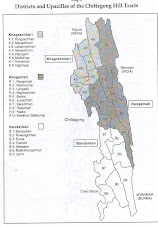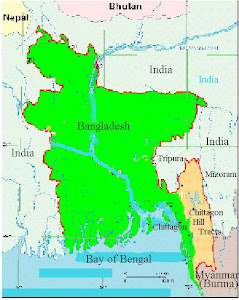

chtnews.com
July 05, 2009
IN Sajek, one of the flashpoints of Rangamati district, the last two months saw an increase in arrests and torture of innocent Jumma villagers, who continue to live in fear of settler attacks similar to the one carried out on 20 April last year. Some of these torture victims came to Dhaka to tell their stories to the journalists. chtnews.com had the opportunity to do interviews with them which we are repeating in a series. Please read the third part of the series below. The first part was sent on 3 July and the second part on 4 July. All the interviews were conducted on Wednesday, 1 July.
6. Interview of Jagot Joti Chakma, 32, village Korengatoli, Bongoltoli Union
It was 20 June. I was working on bamboo rafts [in the river Kachalong]. The army men came and asked whether I had seen some people running away nearby. I said ‘no’. But they would not believe me and began beating me. One soldier snatched my “tagol” (machete) from my hands and hit me on my neck with its blunt side. The army also kicked and beat me with a cane.
They took me to their camp [Baghaihat zone]. At Gol Ghar (round house) in the camp, they tortured me again. I was blindfolded and moved to another place. However, they did not torture me there.
I had Taka 1,230 in my pocket; they took it out and did not return. They took the money when I was in Gol Ghar.
Razzak Mazhi and Sottor came to the camp to recommend for my release.
After release, I went to Baghaihat bazaar and received medical treatment from a Hindu doctor.
When I was arrested, the army did not give me time to tie the bamboos so that thousands of them washed down the river. Some people caught the bamboos downstream, and I had to pay them Taka 30,000. Yet, I did not recover 7,000 pieces of bamboo. I have estimated the loss at Taka 75,000 ($1,071).
7. Interview of Ajit Chakma, 32, Gangaram Dore
It was 28 May. I went to Nanda Kishor’s shop at Gangaram Dore to sell the fish I caught in the river. At first a soldier hit me with an umbrella. I thought he was kidding. Later, the army got me on to their vehicle and drove to the camp [Baghaihat zone], blindfolded.
They hit me trice on my neck. They said: ‘you are a terrorist’. I said: ‘I do business and catch fish.’ ‘No, you are involved in terrorist activities.’ one retorted.
One soldier asked another to bring an electric device, and when he brought it, gave me electric shocks.
When I screamed in pain, they put a piece of wood between my teeth. They also beat me.
After 3 – 4 hours, I asked for water. They unfolded my eyes and said I could go. They served me biscuits, but I refused.
I was taken back to Gol Ghar where I saw Rip Babu, Joti Lal Karbari and Anwar, a member of Baghaihat Bazaar Committee. My wife also came to the camp, but she was not there.
I was released on the condition that I would see the Warrant Officer of the camp on every Sunday.
I was released after 6 - 7 hours of my arrest.
Just before the beating session began, one soldier said: ‘The 2-IC (Second-in-Command) will give you a feast today; which do you prefer – beef “Bhuna” or chicken “Bhuna”?’
It was Warrant Officer Selim who arrested me. Actually he was returning after inaugurating the planting of palm oil trees somewhere in the area.
Four Jummas are now in jail in connection with the killing of the two Bengalis. They are Kala Chulo Chakma, Suman Chakma, Laden Chakma and Mao Setung Chakma.
The army also arrested Boidyo Chakma and Ratan Priya Chakma of Chaminichara village on 7 or 8 May in connection with the murder of the two Bengalis. However, they were released after beating.





